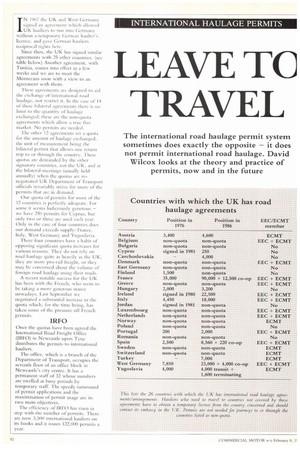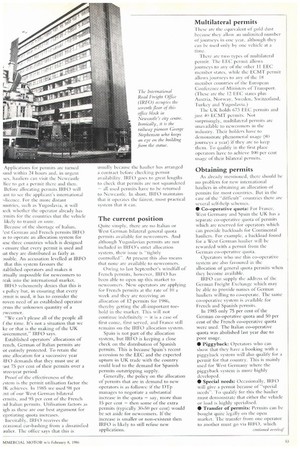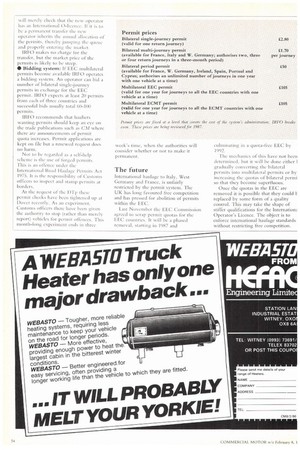LEAVE TO TRAVEL
Page 52

Page 53

Page 54

If you've noticed an error in this article please click here to report it so we can fix it.
The international road haulage permit system sometimes does exactly the opposite — it does not permit international road haulage. David Wilcox looks at the theory and practice of permits, now and in the future
IN 1967 the UK and West Germany signed an agreement which allowed UK hauliers to run into Germany without a temporary German haulier's licence, and gave German hauliers reciprocal rights here.
Since then, the UK has signed similar agreements with 25 other countries. (see table below) Another agreement, with Tunisia, conies into effect in a few weeks and we are to meet the Moroccans soon with a view to an agreement with them.
These agreements are designed to aid the exchange of international road haulage, not restrict it. In the Case of 14 of these bilateral agreements there is no limit to the quantity of haulage exchanged; these are the non-quota agreements which allow a true free market. No permits are needed.
The other 12 agreements set a quota for the amount of haulage exchanged, the unit of' measurement being the bilateral permit that allows one return trip to or through the country. These quotas are demanded by the other signatory countries, not the UK, and at the bilateral meetings (usually held annually) when the quotas are renegotiated UK Department of Transport officials invariably strive for more of the permits that are in demand.
Our quota of permits for most of the 12 countries is perfectly adequate. For some it scents ludicrously generous — we have 25f) permits for Cyprus, but only two or three arc used each year. Only in the Case of four countries does our demand exceeds supply: France, Italy, West Germany and Yugoslavia.
These four countries have a habit of opposing significant quota increases for various reasons. They do not rely on road haulage quite as heavily as the UK, they are more pro-rail freight, or they may be concerned about the volume of foreign road haulage using their roads.
A recent notable success for the UK has been with the French, who seem to be taking a more generous stance nowadays. Last September we negotiated a substantial increase in the quota which, for the time being, has taken some of the pressure off French permits.
IRFO
Once the quotas have been agreed the International Road Freight Office (IRFO) in Newcastle upon Tyne distributes the permits to international hauliers.
The office, which is a branch of the Department of Transport, occupies the seventh floor of an office block in Newcastle's city centre. It has a permanent staff of 32 whose numbers are swelled at busy periods by temporary staff. The speedy turnround of permit applications and the maximisation of permit usage are its two main objectives.
The efficiency of IRFO has risen in step with the number of permits. There are now 3,500 international hauliers on its books and it issues 122,000 permits a year.
Applications for permits are turned mild within 24 hours and, in urgent .set, hauliers can visit the Newcastle Tice to get a permit there and then. Before allocating permits IRFO will ant to see the applicant's international -licence. For the more distant inntries, such as Yugoslavia, it will leek whether the operator already has
for the countries that the vehicle likely to transit Cu route.
Because of the shortage of Italian, 'est German and French permits IRE° is to operate an allocation system for iese three countries which is designed ensure that every permit is used and at they are distributed as fairly as assible. An accusation levelled at IRFO that this system favours the lablished operators and makes it irtually impossible for newcomers to rcak into the international market. IRFO vehemently denies that this is s policy but, in ensuring that every ermit is used, it has to consider the roven need of an established operator ersus the unknown quantity of a evy.comer, "We can't please all of the people all f the time. It's not a situation that we ke or that is the making of the UK ■ overnment,IRFO says.
Established operators' allocations of 'witch, German of Italian permits are ot entirely protected. To retain the ime allocation for a successive year AFO demands that they must use at !ast 75 per cent of their permits over a nee-year period.
Proof of the effectiveness of the ystem is the permit utilisation factor the IK achieves. In 1985 we used 98 per 2nt of our West German bilateral ermits, and 95 per cent of the French id Italian permits. Utilisation factors as igh as these are our best argument for egotiating quota increases. inevitably, IRK) receives the ccasional ear-bashing from a dissatisfied aulier. The office says that this is usually because the haulier has arranged a contract before checking permit availability. MR) goes to great lengths to check that permits are not squandered — all used permits have to be returned to Newcastle. In short. IPTO maintains that it operates the fairest. most practical system that it can.
The current position
Quite simply, there are no Italian or West German bilateral general quota permits available for newcomers. And although Yugoslavian permits are not included in 112,Ris strict allocation system, their issue is "tightly controlled-. At present this also means that none are available to newcomers.
Owing to last September's windfall of French permits, however, 11110 has been able to open up this market to newcomers. New operators are applying for French permits at the rate of 10 a week and they are receiving an allocation of 12 permits for 1986, thereby getting the all-important toehold in the market. This will not continue indefinitely — it is a case of first come, first served, and France still remains on the MR) allocation system.
Spain is not part of the allocation system, but IRFO is keeping a close check on the distribution of Spanish permits. This is because Spain's recent accession to the EEC and the expected upturn in UK trade with the country could lead to the demand for Spanish permits outstripping supply.
Generally, the policy on the allocation of permits that are in demand to new operators is as follows: if the 1)*Fp manages to negotiate a substantial increase in the quota — say, more than 15 per cent — then some of the extra permits (typically 30-50 per cent) would be set aside for newcomers. If the increase is smaller or non-existent then 1RFO is likely to still refuse new applications.
Multilateral permits
These are the equivalent of gold dust because they allow an unlimited number ofjourneys in one year, although they can be used only by one vehicle at a time.
There are two types of multilateral permit_ The EEC permit allows journeys to any of the other 11 EEC member states, while the ECMT permit allows journeys to any of the 18 member countries of the European Conference of Ministers of Transport. (These are the 12 EEC states plus Austria, Norway, Sweden, Switzerland, Turkey and Yugoslavia.)
The UK holds 673 EEC: permits and just 40 ECMT permits. Not surprisingly, multilateral permits are unavailable to newcomers in the industry. Their holders have to demonstrate phenomenal usage (80 journeys a year) if they are to keep them. To qualify in the first place operators have to achieve IOU per cent usage of their bilateral permits.
Obtaining permits
As already mentioned, there should be no problem for new innernational hauliers in obtaining an allocation of permits for most countries. But in the case of the "difficultcountries there are several sell-help schemes. • Co-operative quota: For France, West Germany and Spain the UK has a separate co-operative quota of permits which are reserved for operators which can provide backloads for Continental hauliers, For example, a backload found for a West German haulier will be rewarded with a permit from the German co-operative quota.
Operators who use this co-operative system are also favoured in the
allocation of general quota permits when they become available. IRFO can supply the address of the German Freight Exchange which may be able to provide names of German hauliers willing to co-operate. The same co-operative system is available for French and Spanish permits. In 1985 only 75 per cent of the German co-operative quota and 50 per cent of the French co-operative quota were used. The Italian co-operative quota was abolished last year due to poor usage.
• Piggyback: Operators who can show that they have a booking with a piggyback system will also qualify for a permit for that country. This is mainly used for West Germany where the piggyback system is more highly developed. • Special needs: Occasionally, 11(R) will give a permit because of "special needs-. To qualify for this the haulier must demonstrate that either the vehicle or load is highly specialised.
• Transfer of permits: Permits can be bought quite legally on the open
market. The transfer from one operator to another must go via IRFO, which will merely check that the new operator has an International 0-licence. If it is to be a perlil anent trians6:r the new
operator inherits the annual allocation or the permits, diereby LI 01 pit ig the queue and properly entering the market.
IRFO makes no charge for the
transfer, hut the market price of the permits is likely to he steep.
• Bidding system: If EEC multilateral permits become available IRFO operates a bidding system. An operator can bid a number of bilateral single-journey permits in exchange for the EEC permit. IRFO expects at least 20 permits from each of three countries and successful bids usually total 611-100 permits.
IRFO reCOITIMCIlds that hauliers wanting permits should keep an eye on the trade publications such as CM where there are alMOLIIICCIllerl CS of permit quota increases. Permit applications are kept on file but a renewed request does no harm.
Not to be regarded as a self-help scheme is the use of t-orged permits. This Is an offence under the
International Road Haulage Permits Act 1975. It is the responsibility of Customs officers to inspect and stamp permits at borders.
At the request of the DTp these permit checks have been tightened up at Dover recently. As an experiment, Customs officers there have been given the authority to stop (rather than merely report) vehicles tbr permit offences. This month-long experiment ends in three week's time, when the authorities will consider whether or not to make it permanent.
The future
International haulage to Italy, West Germany and France, is unfairly restricted by the permit system. The UK has long favoured free competition and has pressed For abolition of permits within the EEC.
Last November the EEC Commission agreed to scrap permit quotas for the EEC countries. It will be a phased removal, starting in 1987 and culminating in a quota-free EEC by 1992.
.[he mechanics of this have not been determined, but it will be done either I gradually converting the bilateral permits into multilateral permits or by increasing the quotas of bilateral permi so that they become superfluous.
Once the quotas in the EEC are removed it is possible that they could replaced by some form of a quality control. This may take the shape of stiffer qualifications for the Internation; Operator's Licence. The object is to enforce international haulage standards without restricting free competition.




























































